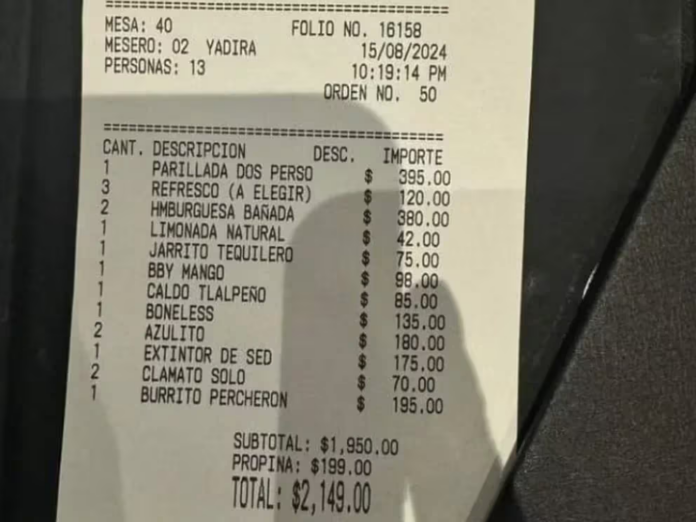:quality(85)/cloudfront-us-east-1.images.arcpublishing.com/infobae/QU6SUXE5DVD7ZC2YZ7UCCBV2AY.png)
As part of the functions of the Federal Consumer Protection Agency (PROFECO) to “empower the consumer through the effective protection of the exercise of their rights and citizen trust, promoting reasoned, informed, sustainable, safe and healthy consumption, in order to correct market injustices, strengthen the internal market and the well-being of the population.”
Recently, the aforementioned agency proceeded to sanction the restaurant “Terraza Saltillo”, after a few days ago it went viral on social networks that in said place the tip is charged “Chinese style”, a very popular term among Mexicans.
According to article 10 of the Federal Consumer Protection Law, “suppliers may not apply coercive and unfair commercial methods or practices, nor abusive or imposed clauses or conditions in the supply of products or services.”
The above, after a Facebook user published a consumption ticket from August 15 in which the tip was charged without the consent of the diners.
In the payment receipt issued by the place located at Aceitilla 246, Loma Linda neighborhood, in Saltillo, Coahuila, it can be seen that the consumption was made to those who occupied “table 40”, “waiter 02 Yadira”, and that it was occupied by 13 people who consumed drinks and dishes for a total of 1,950 pesos, but the detail was that without asking them, they charged them 10 percent of tip, for a total payment of 2,149 pesos.
“We went to eat with some friends, and when we asked for the bill, SURPRISE! They had already charged us the tip without even asking,” reads the publication.
After the issue became widespread, PROFECO proceeded to suspend the restaurant and not close it as was reported, which was pointed out by restaurant managers in statements to a local media outlet, in addition to “there being a wave of comments for and against, in addition to generating confusion among regular customers who thought the place was closed and this caused low sales,” they said.
Mandatory tip?
In Mexico, tipping is a common practice, since it is a way of thanking and compensating restaurant and hotel workers, among others, for their services. Although there is no rule or law that establishes it as an obligation, socially its omission can be interpreted as an offense to the staff. To do so, consider the following aspects:
When the service or food is good.
When you are invited to a place.
When it is budgeted.
Consider the country, since in some it is offensive, uncomfortable or embarrassing.
Source: infobae






